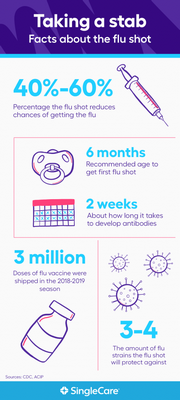
Early flu symptoms can be difficult to recognize. But the sooner you know what to expect, the better you can treat the virus early on. Early symptoms may include: fever, swollen lymph nodes in the upper respiratory tract, headaches, body aches, vomiting, and difficulty breathing. Other common flu symptoms include persistent fatigue, swollen lymph nodes in the upper respiratory tract, irritability, and drowsiness. Great fatigue and weakness may interfere with your daily activities. If you experience these symptoms, you need to see your doctor immediately for a correct diagnosis.
Flu season is a time when you are more likely than usual to catch the flu. Influenza viruses can survive on surfaces for up to 21 days. Here are some tips to help you reduce your risk of getting the flu this season.
The best way to protect yourself is to get the seasonal flu vaccine. The shots prevent multiple strains of flu from infecting your body.
Coughing is a common early flu symptom. The cough may not be serious, but if it lasts more than two weeks or is accompanied by a sore throat, headache, and fever, it should be checked with a doctor. The cough is caused by an infection called the common cold.
Sore throat is caused by bacteria. If symptoms persist, see your doctor for evaluation and treatment.
Fever, which can be mild or severe, can come on suddenly and is often accompanied by chills, sore throat, or sore throat. Facial swelling and redness are other flu symptoms to watch out for. If you feel dizzy, have trouble breathing, or feel like you might pass out, see your doctor right away for immediate treatment. If you experience these symptoms, you should see your doctor immediately for the correct diagnosis and treatment.
Another way to prevent early flu symptoms is to avoid spreading the virus through sneezing, coughing, or coughing. This will make you more likely to get the virus when you cough. The virus can also be transmitted through the eyes.
Flu season is a scary time, so act early and avoid getting sick. While some people do not get the flu at all, others suffer from extreme fatigue, vomiting, aches and pains.

Flu-like symptoms are experienced by about one in four people affected by this flu season. Symptoms include fever, headache, swollen glands, body aches and loss of appetite, as well as vomiting and diarrhea.
Some people also experience nausea and vomiting. There are times when these symptoms are more severe than other flu symptoms because they are usually more severe.
To relieve these flu symptoms, take some ibuprofen to relieve headaches and aches. Use over-the-counter medications to relieve pain.
Ample time to rest. You may also find that drinking plenty of water can help relieve fatigue and improve sleep at night.
These tips to help prevent flu symptoms may not always help. When symptoms become severe, you should see your doctor for proper care and treatment. Remember, flu can be avoided and prevented by getting vaccinated.
As you age, your immune system weakens and your body becomes vulnerable to colds and flu. Your immune system must fight any virus that attacks your body. However, during flu season, you are vulnerable and must be vaccinated to avoid infection.
If you think you might get the flu, get vaccinated now. This will protect you and your family from disease and transmission of the virus to others.
Flu season is always a scary time, but don’t worry. There is some help to help you with flu symptoms and help you prepare for the upcoming flu season.
Leave a Reply